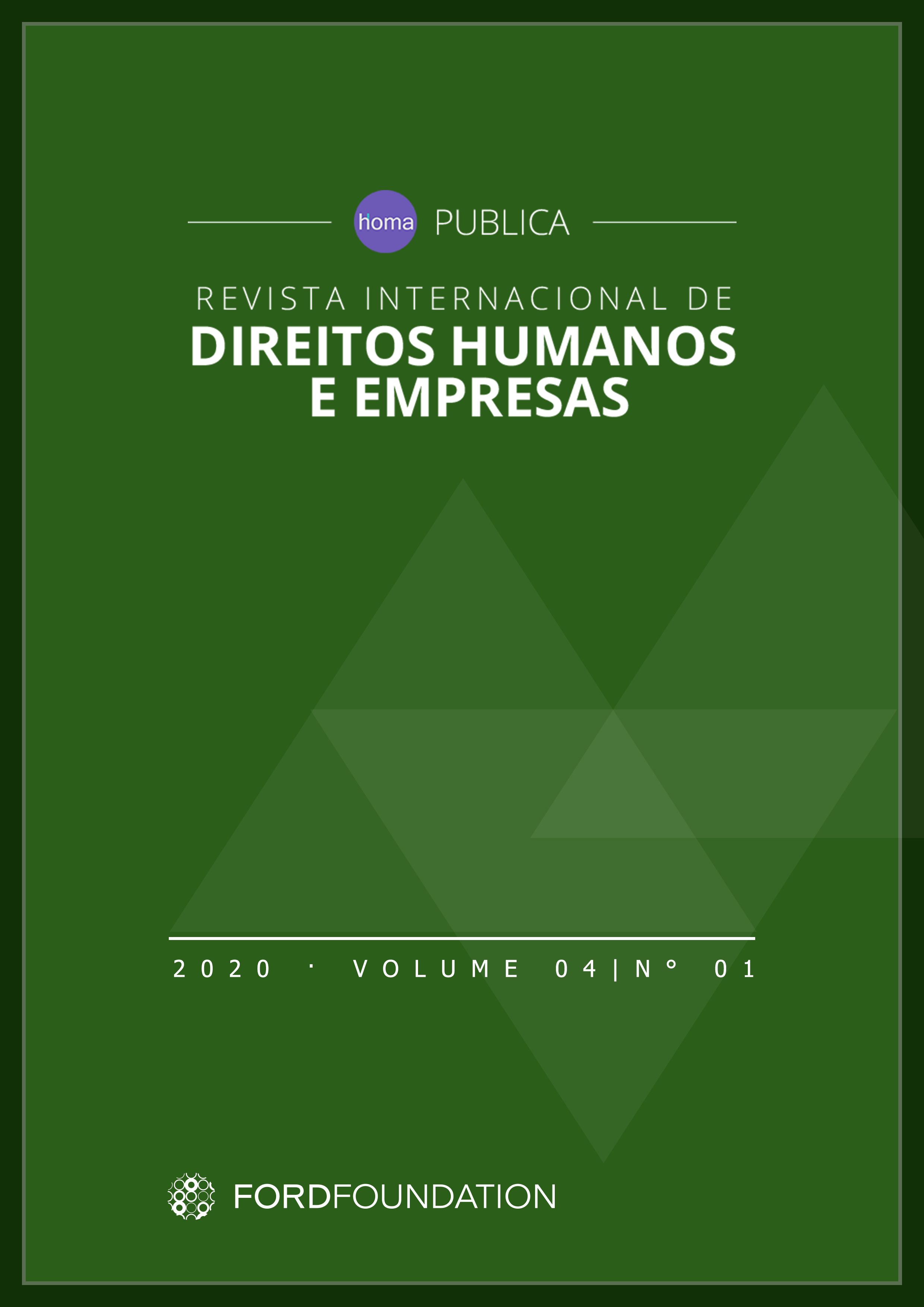Publicado 2020-01-30
Palabras clave
- Direitos Humanos,
- Direito Internacional,
- Transnacionais,
- Responsabilização
Cómo citar
Resumen
A expansão da atuação das empresas transnacionais transformou o cenário internacional. Empresas passaram a exercer o domínio além das fronteiras dos países onde se encontram sediadas, tornando-se fortes agentes da economia. O objetivo da pesquisa é buscar uma solução para as constantes violações de direitos humanos cometidas pelas transnacionais. A metodologia utilizada foi o método hipotético-dedutivo e análise bibliográfica. Constatou-se que no cenário atual vislumbra-se que os Estados já não são os únicos a violar os direitos do homem, nem os únicos que deveriam ser responsáveis por promover seu respeito e proteção. Desta forma, torna-se imprescindível a busca pelo fortalecimento dos mecanismos de proteção e de responsabilização das transnacionais pelas violações que as estas vierem a cometer.
Descargas
Citas
AFRICAN RESOURCES WATCH. Business & Human Rights Resource Centre. Disponível em: https://www.business-humanrights.org/en/african-resources-watch-afrewatch. Acesso em: 06 jun. 2018.
AMARAL, Júnior. Sujeitos de direito internacional público. Introdução ao direito internacional público. São Paulo: Atlas, 2008.
AMARAL, Renata. Pessoas Internacionais. Direito Internacional Público e Privado. Porto Alegre: Verbo Jurídico, 2010.
ANISTIA. Trabalho infantil e exploração na República Democrática do Congo alimentam a produção mundial de baterias. Disponível em: https://anistia.org.br/noticias/trabalho-infantil-e-exploracao-na-republica-democratica-congo-alimentam-producao-mundial-de-baterias/. Acesso em: 28 mai. 2018.
BRIERLY, James L. The shortcomings of Internacional Law, 1924, p. 16.
CAMPOS, Thana Cristina. Empresas transnacionais e direitos humanos: as empresas farmacêuticas como objeto de estudo. Belo Horizonte: Fórum, 2012.
CANÇADO TRINDADE, Antônio Augusto. Os Tribunais Internacionais contemporâneos e a busca da realização do ideal da justiça internacional. Revista da Faculdade de Direito UFMG. Belo Horizonte, n. 57, p. 37 - 68, jul./dez. 2010, p. 47.
CERQUEIRA, Daniel. The Attribution of Extraterritorial Liability for the Acts of Private parties in the Inter-American System: Contributions to the Debate on Corporations and Human Rights. Aportes DPLF, number 20, year 8, August 2015.
CORTE EUROPÉIA DE DIREITOS HUMANOS. Caso Autronic A.G. contra Suiça, 24 de setembro de 1990, Demanda nº 12726/87.
CORTE EUROPÉIA DE DIREITOS HUMANOS. Caso Societé Cola s Est v. França, 16 de abril de 2002, Demanda nº 37971/97.
DEVA, Surya. The Human Rights Obligations of Business: Reimagining the Treaty Business. 2014. Disponível em: https://www.business-humanrights.org/sites/default/files/media/documents/reimagine_int_law_for_bhr.pdf. Acesso em 08 de out. 2018.
DINIZ, Gustavo Saad. Grupos Societários: da formação à falência. Rio de Janeiro: Forense, 2016.
FACHIN, Melina Girardi; et al. Ponto cego do direito internacional dos direitos humanos: uma superação do paradigma estatocêntrico e a responsabilidade internacional de empresas violadoras de direitos humanos. In: Homa Publica: Revista Internacional de Direitos Humanos e Empresas. Vol. 1; Juiz de Fora: Homa, 2016.
GLOBAL JUSTICE NOW, 1O biggest corporations make more Money than most countris in the world combined. 12 set. 2016. Disponível em: https://www.globaljustice.org.uk/news/2016/sep/12/10-biggest-corporations-make-more-money-most-countries-world-combined. Acesso em 08 out. 2018.
HUSEK, Carlos. Sujeitos Internacionais. Curso de Direito Internacional Público. 3° ed. São Paulo: LTr, 2000.
INPACTO, Adidas Rompe com 13 fornecedores da Ásia e emite advertência para países. 01 jul. 2015. Disponível em: http://www.inpacto.org.br/en/2015/07/adidas-rompe-com-13-fornecedores-da-asia-e-emite-carta-de-advertencia-para-paises/. Acesso em 15 ago. 2018.
NOWROT, Karsten. New Approaches to the International Legal Personality of Multinational Corporations Towards a Rebuttable Presumption of Normative Responsibilities. Disponível em: http://esil-sedi.eu/wp-content/uploads/2018/04/Nowrot.pdf. Acesso em 07 out. 2018.
ONU, Guiding Principles on Business and Human Rights, 2011. Disponível em: https://www.ohchr.org/Documents/Publications/GuidingPrinciplesBusinessHR_EN.pdf. Acesso em 17 out. 2018.
RAMOS, André́ de Carvalho. Curso de Direitos Humanos. 3ed. São Paulo: Saraiva, 2016.
RODIONOVA, Zlata. World’s largest corporations make more money than most countries on Earth combined. United Kingdom, 13 set. 2016. Disponível em: https://www.independent.co.uk/news/business/news/worlds-largest-corporations-more-money-countries-world-combined-apple-walmart-shell-global-justice-a7245991.html. Acesso em: 08 out. 2018.
RUGGIE, John Gerard. Empresas e Direitos Humanos: parâmetros da ONU para proteger, respeitar e reparar. Tradução de Conectas Direitos Humanos. São Paulo: Conectas Direitos Humanos, 2011.
SALDANHA, Jânia Maria Lopes; BOHRZ, Clara Rossatto. Dupla Influência e dupla projeção entre global e local: O “caso Mariana” e a (ir)responsabilidade social das empresas de mineração. In: Homa Publica: Revista Internacional de Direitos Humanos e Empresas. Vol. 2; Juiz de Fora: Homa, 2018.
SCABIN, Flavia Silva. CRUZ, Julia Cortez da Cunha. HOJAIJ, Tamara Brezighello. Processos de auditoria em direitos humanos e mecanismos de participação: lições e desafios advindos do licenciamento ambiental. Aracê – Direitos Humanos em Revista. São Paulo. Ano 2, número 3. Setembro, 2015. Disponível em: https://arace.emnuvens.com.br/arace/article/view/58/42. Acesso em: 12 jul. 2016.
TEIXEIRA, Bárbara Bittar. Direitos Humanos e Empresas: A responsabilidade por exploração de trabalhadores em condições análogas à de escravo nas cadeias produtivas da indústria têxtil. Dissertação (Mestrado em Direito e Desenvolvimento) – Fundação Getúlio Vargas, São Paulo, 2018.
UN GLOBAL COMPACT. Embedding Human Rights into Business Practice. Un Global Compact, 2003.
UNITED NATIONS OFFICE OF THE HIGH COMISSIONER FOR HUMAN RIGHTS. Guiding Principles on Business and Human Rights. Disponível em: http://www.ohchr.org/Documents/Publications/GuidingPrinciplesBusinessHR_EN.pdf Acesso em: 25 mai. 2018.
UNITED NATIONS. Norms on the Responsibilities of Transnational Corporations and Other Business Enterprises with Regard to Human Rights. Geneva: 2003.
VEJA, TRT confirma condenação da M. Officer por trabalho escravo. 10 abr. 2018. Disponível em: https://veja.abril.com.br/economia/trt-confirma-condenacao-da-m-officer-por-trabalho-escravo/ Acesso em 15 ago. 2018.
WEISSBRODT, David. Business and Human Rights. In: University of Cincinnati Law Review. Vol. 74. 2005.

